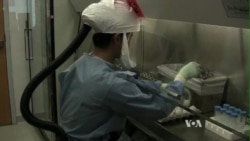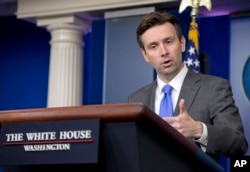President Barack Obama is set to outline his plan to boost the U.S. response to the Ebola outbreak that has killed more than 2,400 people in West Africa. The president travels to the U.S. Centers for Disease Control (CDC) in Atlanta Tuesday for a briefing with health experts leading American efforts to stem the outbreak.
The president’s visit to the CDC comes amid calls from West African leaders and international health officials for the United States to do more to assist nations that are struggling to keep up with an epidemic that the center’s director, Dr. Tom Frieden, recently said is spiraling out of control.
Near daily images of patients lying on the ground and left to die are coming out of countries like Liberia.
White House spokesman Josh Earnest told reporters in Washington Monday that because of its capabilities, the United States had a unique responsibility to step up in the midst of this international crisis.
“Our doctors and scientists are some of the best in the world, and we are going to deploy their knowledge and resources to try to help some of the governments in Africa meet the needs of their people and try to confront this very difficult challenge,” he said.
Earnest would not give details on President Obama’s announcement Tuesday to increase the U.S. “whole-of-government” response to Ebola. But The Wall Street Journal on Monday quoted officials who said the president was considering sending more portable hospitals, doctors, supplies and experts to train health care workers in Liberia and other affected countries.
So far, the United States has committed $100 million towards the fight since March, with the CDC also sending 100 of its workers to the region, among the largest such deployments in the U.S. agency’s history.
White House spokesman Josh Earnest said the United States must do more.
“Making an investment here early is critical to trying to snuff out this problem before it becomes a much more widespread problem. And that is the strategy that we are trying to implement here is to try to invest early,” he said.
In a recent interview with NBC-TV's Meet the Press, President Obama said while Ebola did not pose an imminent threat to Americans, containing the outbreak was a top national security priority.
“If we don’t make that effort now, and this spreads not just through Africa, but other parts of the world, there is the prospect that the virus mutates. It becomes more easily transmittable. And then it could be a serious danger to the United States,” he said.
In that interview, President Obama went on to say that the U.S. military would be helping set up isolation units and equipment, while providing security for international aid workers dealing with the crisis on the ground.






